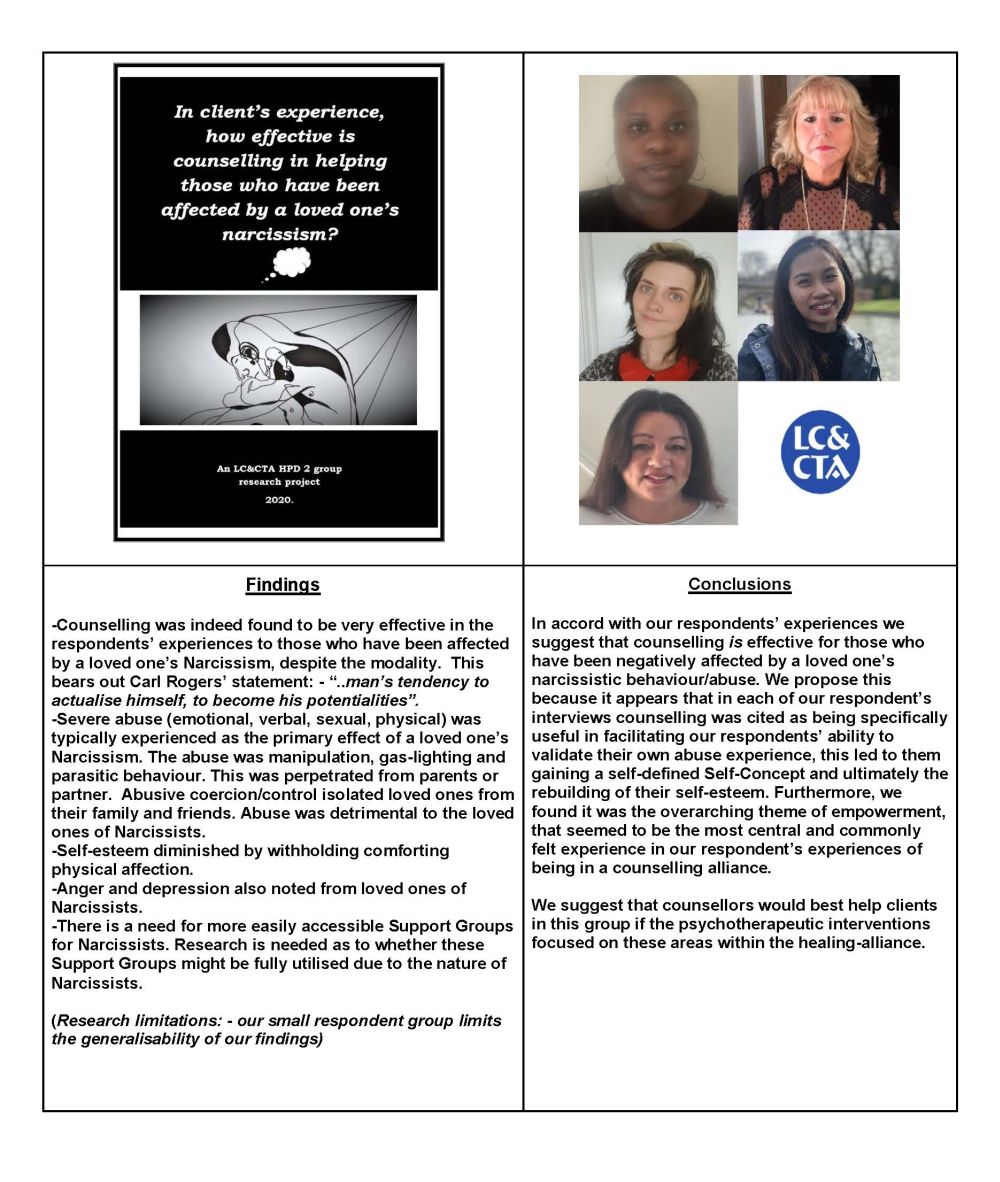
Aim or purpose
The aim was to investigate the experiences of clients affected by a loved one’s narcissistic behaviour (defined in the DSM IV, 2013). Our purpose was to highlight how effective counselling is in helping clients in this group recover from any negative impact such behaviour had on their lives.
Design and methodology
Three semi-structured, audio recorded interviews were held with respondents who self-identified as being affected by a loved one’s narcissistic behaviour. Respondents were recruited via social media posts. Data was thematically analysed by highlighting recurring themes and anomalies within the data; informed by the principals of phenomenology (Smith et al, 2009).
Ethical approval
The research proposal was submitted to and approved by the researchers’ College Ethical Approval Board. Respondents were offered six fee-free counselling sessions if issues arose for them after participation in the research which was carried out in line with the BACP Ethical Guidelines for Research in Counselling and Psychotherapy (Mitchels, 2018).
Results and findings
Findings indicated respondents had experienced abuse/trauma through systematic patterns of coercion and control which isolated them from other relationships with family members and/or friends. Gas-lighting (deliberate distortion/confusion of respondents’ reality) by the loved one and parasitic behaviour also damaged respondents’ sense of self, affected their mental wellbeing and lowered their self- esteem. For all the respondents, counselling (various modalities) facilitated identification of the specific forms of abuse/how it manifested within the relationship; which empowered respondents to begin to re-trust their own experience. Counselling also helped re-establish respondents’ sense of self, sequentially increasing their self-worth and enhanced their psychological wellbeing.
Research limitations
The small respondent sample restricts generalisation of our findings (McLeod, 2003) and our subjective data may only be pertinent to those respondents who took part in our research.
Conclusions and implications
In accord with respondents’ experiences we suggest that counselling is effective for those who have been negatively affected by a loved one’s narcissistic behaviour/abuse. It further appears counselling, regardless of modality, is specifically useful in facilitating clients’ ability to validate their own abused experience/s, re-gain a self-defined self-concept and rebuild their self-esteem. Findings suggest that counsellors would best help clients in this group if the psychotherapeutic interventions focused on these areas within the healing-alliance.
References
American Psychiatric Association. (2013) Diagnostic and Statistical Manual of Mental Disorders DSM - 5. 5th Ed.
Arlington, VA: American Psychiatric Association.
McLeod,J. (2003) Doing Counselling Research, 2nd Edition. London: SAGE Publications Ltd.
Mitchels, B. (2018) Ethical Guidelines for Research in the Counselling Professions. Leicestershire: BACP House
Smith, J., Flowers, P. and Larkin, M. (2009) ‘Interpretative Phenomenological Analysis; Theory, Method and research.’ London: SAGE Publications Ltd.
Views expressed in this article are the views of the writer and not necessarily the views of BACP. Publication does not imply endorsement of the writer’s views. Reasonable care has been taken to avoid errors but no liability will be accepted for any errors that may occur.
